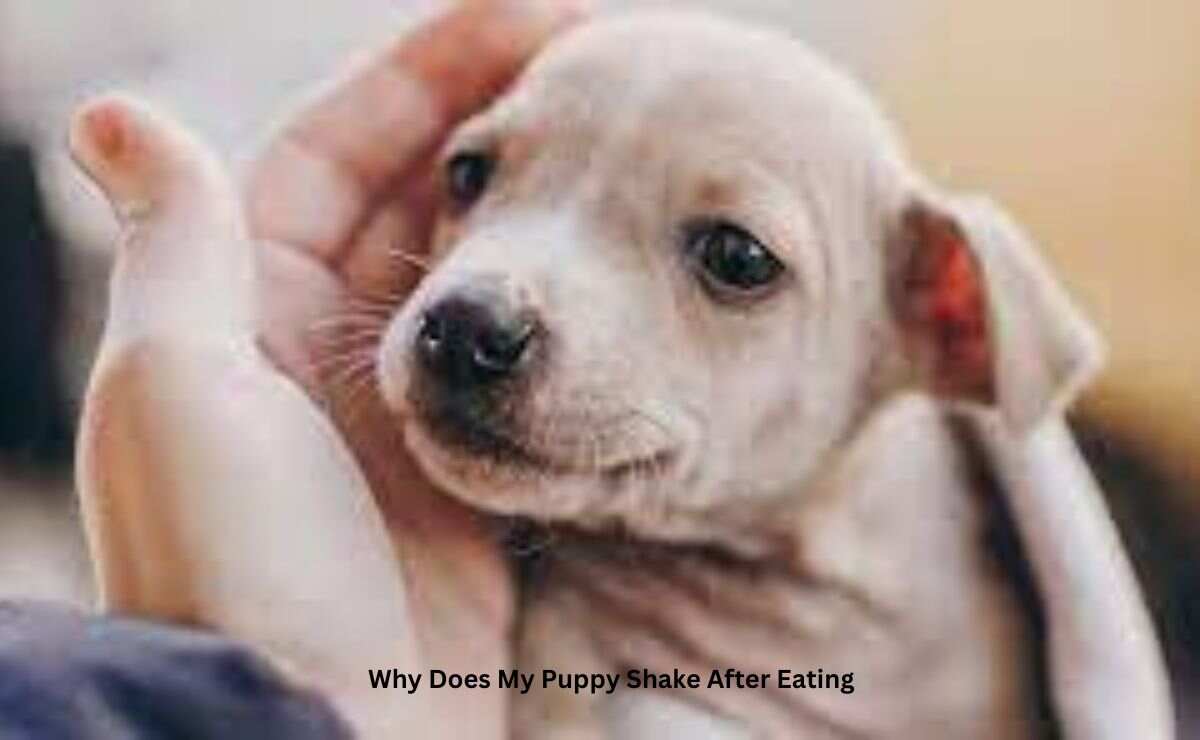Inspecting puppies shivering after meals is tough without any professional vet’s help. Some ways might help to catch the exact reasons why does my puppy shakes after eating? Therefore, keep continuing to diagnose the problem by yourself.
This anatomical tangle may happen to the whelp for indigestion, giving toxic foods, effects of allergies or temperature changes. Besides, puppies are susceptible and emotional by birth. This could sometimes lead to mental and physical suffering, which might be another reason for trembling.
However, continued shaking after a meal in a puppy is not a routine matter. Take action immediately if you notice it is shivering for a couple of days after eating.
Why Does My Puppy Shake After Eating Meal – Reasons & Solution at a Glance

Before discussing the whole matter with solutions, here are a few hints. This will help you find a quick solution in an emergency.
| Reasons for Shaking in Puppy | Actions to Take |
| Toxic Diet | Reduce the size of food |
| Cold Temperature | Give the pet lukewarm water to eat with room-temperature food |
| Effects of Distemper | Vaccinate Your Puppy |
| Fear, Anxiety and Others | Give it time to feel comfortable |
| Ear Problems | Keep the dogs’ ears dry and clean |
| Allergic Reaction | Consult A Vet |
| Low Blood Sugar | Adjust feeding routine |
| Toothache | Avoid giving your puppy chewy, crunchy food |
| Generalized Tremor Syndrome | Consult a Vet |
| Upset Stomach | Notice their eating habits. If they are eating unhealthy food without your attention, withhold them |
Below are the the main causes of Puppy’s Shaking After Eating Meal along with probable remedies:
1. Toxic Diet or Food
Puppies are usually less capable of digesting solid food than the old dog. In that case, if the dog cannot digest the food properly, it will vomit.
Sometimes, you may notice other symptoms like breathing disturbance and shaking after eating. It generally causes the indigestion of solid food that causes stomach pain in the puppy’s body.
Remedy to Take:
Try to reduce the size of the food. Mention not; big-size food is troublesome for the puppy to digest. Besides, ensure that the food you give them is free from all kinds of toxic elements like lead, nickel etc.
Even if it is made with poisonous plants or chemical products, this might let the little pups tremble. Therefore, be careful to choose the food items for the puppy and remember to check the ingredients.
2. Overeating Food
These little furballs are too fond of eating and can’t stop until they’re full. This means they will continue to eat food at the rest of the plate, whether their tummy is full. Overeating food is often responsible for a dog’s trembling issues.
Remedy to Take:
Giving too much food to the puppy isn’t a significant issue. But you should limit the food as it may cause indigestion. Try to withhold food for some days.
Withholding doesn’t mean your puppy won’t get the necessary nutrition from food. It just prevents indigestion and provides sufficient nutrition to the puppies.
3. Indigestive Issues
Indigestion is another triggering reason for puppies after meal wagging. Some puppies have sensitive indigestion problems from their birth. This means you need to be conscious about feeding the pup.
It often happens when anyone changes their normal food habits. Suppose you give the puppies dry food at 10–12 weeks. But it may take some time to adapt when you suddenly start giving wet food.
For this reason, these little furry pets began shivering after taking meals for indigestion issues.
Furthermore, shaking after a meal can signify digestive discomforts, such as Nausea, indigestion, or an upset stomach. This may happen due to food allergies or sensitivities, overeating, or eating too quickly.
Remedy to Take:
The only solution to this issue is omitting the food that causes indigestion problems for your pet. Usually, this problem will be resolved by itself.
However, sometimes it seems necessary to change the regular diet chart of puppies. But one should remember that the procedures must be applied in various ways. Give the pet food little by little so that it can adjust to the regular diet of this little fur.
4. Excitement
Puppies may become excited after a meal, mainly if they are still in the early stages of training and are being rewarded with food. This excitement can lead to shaking or trembling.
Remedy to Take:
Watch out for your puppy for the next few hours and observe their behavior. If they continue to shake excessively or other symptoms arise, such as vomiting or diarrhea, it’s best to contact your veterinarian.
5. Cold:
If your puppy shakes after a meal, it may feel cold. This is especially true if the room is chilly or the puppy is wet.
Remedy to Take:
Try to keep the environment warm. Puppies can get cold quickly, so make sure their environment is warm and comfortable. You can also provide a warm blanket or bed for them to curl up.
6. Low Blood Sugar:
Puppies have small stomachs and may need to eat frequently to maintain their blood sugar levels. If your puppy shakes after a meal, it could indicate that its blood sugar levels have dropped too low.
Remedy to Take:
Adjusting the feeding routine is one of the most common ways to prevent low blood sugar issues. Try feeding your puppy smaller meals throughout the day instead of one large meal.
7. Nausea
Nausea is a general physical abnormality among dogs and puppies that may lead them to tremble. It happens when the dog eats voraciously and suffers from healing issues. Other symptoms of Nausea include:
- The dog or puppy used to frequently vomit
- Shivering or quaking
- Diarrhea or lose of motion
- Dry hefting
- Excessive licking than previous
Remedy to Take:
As this is a severe issue, you should consult any veterinarian experts. There is no home remedy for this disease to treat your dog or puppy.
8. Toothache
Dental issues are the most common problems among puppies. Naturally, puppies bark more while teething. As they’re not grown up to take solid or crunchy foods, it may lead the puppy to shake their head. Head bobbing is a common sign that the puppies have toothache problems. Besides, it might have some other symptoms, including:
- Teeth infection
- Puffy gums
- Immature teeth or broken teeth
- A foreign object stuck in its mouth, etc.
Remedy to Take:
Abstain from giving the pups solid, crunchy, chewy food until their teeth are matured. Do maintain it when your puppies are going through the teething process also. Because during this time, they shake their head and body naturally.
9. GTS (Generalized Tremor Syndrome)
If the above symptoms and remedies don’t suit the pups, then it might happen for GTS. Generalized tremor syndrome is a common disease among dogs that causes uncontrollable shaking.
Remedy to Take:
Unlike the disease known as Parkinson’s, Hysteria among human beings, GTS is a typical trembling problem in dogs. Your puppy noticeably used to shake their body for a couple of minutes.
As this is still in research, the actual cause of GTS needs to be clarified. But both puppies and adult dogs are affected by this illness.
10. Upset Stomach / Food Poison
An upset stomach is another symptom that may make dogs shake their body after a meal. Giving contaminated food to the pups is the main culprit. Again, adding new food elements in large amounts can be another reason for dog food poisoning grief.
Remedy to Take:
Food poisoning and sudden stomach-ache aren’t similar, but they might be severe if not taken action swiftly.
When you notice your pups have food poison, watch their eating habits. Some little furballs fondly eat grass or soil while roaming outside. Notice where they’re going and what they eat if you nurture them in the garden or backyard.
When to Consult the Vet for Puppy’s Trembling?
If your pet is trembling, it may indicate an underlying health issue, so you should immediately consult a veterinarian.
In addition, if the trembling is severe or persistent, or if it’s accompanied by other symptoms such as lethargy, loss of appetite, vomiting, or diarrhea, it’s essential to seek veterinary care immediately.
If the trembling is mild and your pet seems otherwise healthy, you should monitor them closely for a day or two to see if it persists or worsens. If it does, or if you notice any other concerning symptoms, it’s best to consult a veterinarian.
FAQs
Why Does My Puppy Shiver After Eating Meal?
The reason varies on the pup’s physical symptoms. Sometimes they feel shivering from indigestion, Nausea, distemper and other medical diseases. You need to identify their problem and consult the vet if necessary.
How to Treat a Puppy That Shakes After Eating Meal?
Keep the dog warm as much as possible. Check the body temperature to ensure the puppy is healthy and free from another indigenous disease. Give more attention, and play with it. Try to provide nutritious and nontoxic food to the pups as it helps to recover from shaking.
Why Do Puppies Shake and Twitch?
Puppies are used to twitch as it is a part of their healthy development, especially for newborns. Twitching and shaking is a physical movement that often strengthens muscles, brains and others.
Do Puppies Shake When They Get Tired?
Of course, a puppy, even a senior dog, may shake if they feel tired, fatigued and strained. Their body may also shake due to the loss of muscles.
Why Does My 2 Month Old Puppy Shake?
It happens if they’re suffering from anxiety or stress or seeking more attention from their owner. Besides, 2-month puppies show trembling on their body and head for aging. Feeling excessive cold or warmth surrounding them is another common reason for their shivering.
Conclusion
Still thinking about why does my puppy shake after meal. If you’re, remember that shaking after a meal is often expected. But if you’re concerned, it would easily be diagnosed and cured.
Puppies are too sensitive to cold and warm weather. That’s why they require more care than the old-aged dogs. To keep them healthy and cheerful all the time, give them time. Play with them and feed them food from time to time.
Get their medical checkups done at the closest veterinary clinic or charity. Ensure toxic-free meals and add more nutrition to rectify their trembling issues.
